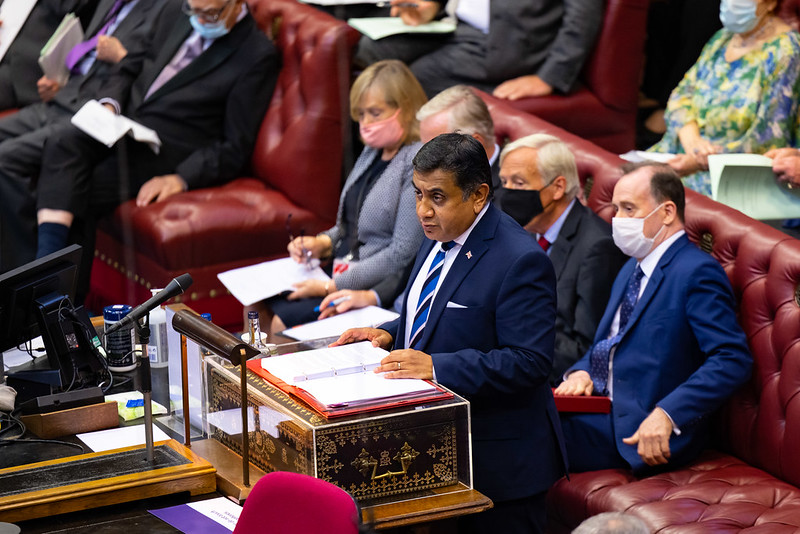2021 in the House of Lords
17 December 2021
As the House of Lords pauses for recess until January, we look back at an action-packed year in the UK Parliament’s second chamber.
Sitting for over 150 days this year, members pressed government on its decisions and actions in more than 630 oral and urgent (Private Notice) questions. Members also quizzed the government in more than 8,000 written questions on a variety of topics.
In considering legislation, over 56,000 votes were cast in more than 125 divisions this year on topics such as reducing the discharge of sewage into the sea, preventing leaseholders having to pay fire safety remediation costs and maintaining standards in new trade deals.
Beyond the chamber, more than 700 regulations were considered by the Secondary Legislation Scrutiny Committee in 2021. These are pieces of law created by ministers or bodies that affect all of us. Find out more in the latest episode of the House of Lords Podcast.
Jump to
- January
- February
- March
- April
- May
- June
- July
- August
- September
- October
- November
- December
- Committees
- Podcast
- Get involved
January
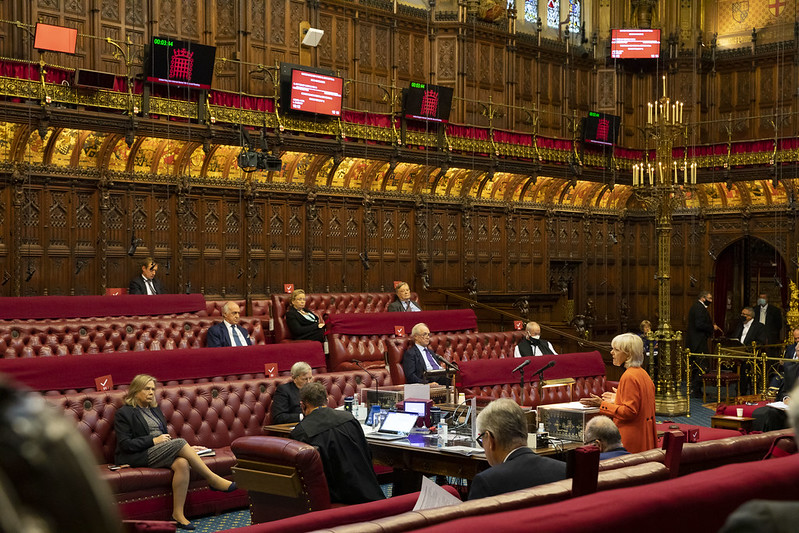
The House of Lords meeting during hybrid proceedings
Photos: House of Lords / Roger Harris
January saw the House return to business, following a recall on 30 December 2020 to pass the EU Future Relationship Act.
It also saw the start of Lords consideration of the Domestic Abuse Bill, with members setting out areas they would return to at later stages. Members also completed detailed check of the Trade Bill, agreeing to include changes on topics including goods and services in Northern Ireland, online child protection and maintaining standards on food and animal welfare before it was sent to the Commons for its consideration of Lords changes.
During January, members pressed the government on its decisions and actions in questions including the national security law in Hong Kong; the quality of food parcels provided to families during lockdown; the rollout of COVID-19 vaccinations; the impact of COVID-19 on the night-time economy; and the impact of the UK-EU trade agreement on music touring.
February
February began with members pressing the government on the Northern Ireland Protocol and the suspension of inspections at borders and COVID-19 quarantine hotels. During the month, the Lords also quizzed government on Operation Midland, and a boycott of the Beijing 2022 Winter Olympics.
In legislation, consideration of changes to the Trade Bill continued between the Lords and the Commons, with compromises proposed on dealing with countries that commit genocide and Parliament’s role in scrutinising new trade agreements. Members also agreed on a compromise with the Commons on future reviews of the provisions in the Medicines and Medical Devices Bill following calls in the Lords at earlier stages.
Members also put on record their concerns that renters’ protections from eviction during the pandemic did not go far enough.
March
March began and ended with consideration of the Counter-Terrorism and Sentencing Bill, with members putting forward proposals to restrict the length of Terrorism Prevention and Investigation Measures notices, which can impose restrictions on individuals, and subsequently agreeing a change with the Commons to limit their length to five years. During consideration of the Fire Safety Bill, the House asked government to think again on protecting tenants and leaseholders from building costs to fix safety issues.
In debates, the House discussed the economy in light of the budget, with a former Chancellor, ex-TUC General Secretary and CBI President taking part among others. Members bring their expertise and experience to their work checking and challenging the government. Members also debated the UK’s role in empowering women in the recovery from the impact of COVID-19 in the International Women’s Day debate.
In questions, members continued to press the government on the Northern Ireland Protocol and the situation in Hong Kong, including electoral reforms and independence of judges. The House also quizzed government on tackling institutional and structural racism in the UK, and policing and prevention of violence against women.
The House also marked one year since the first lockdown during the COVID-19 pandemic on 23 March.
April
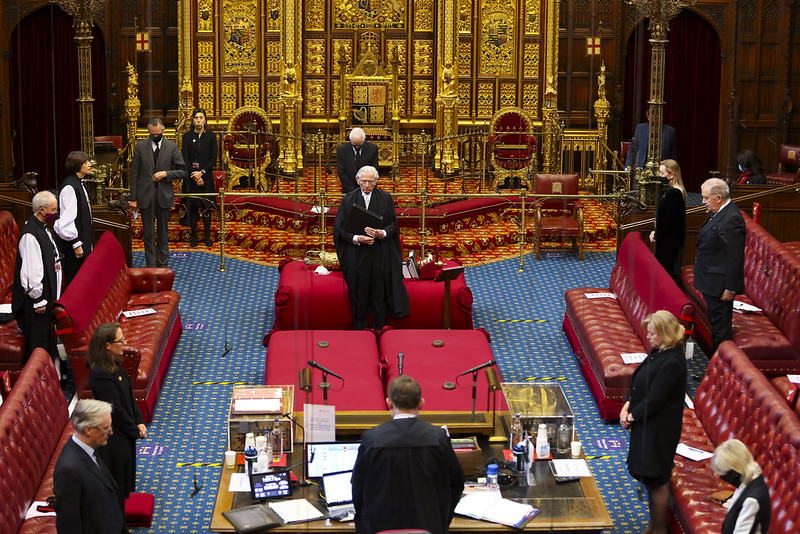
House of Lords holds a minute's silence before paying tribute to the Duke of Edinburgh
Photo: House of Lords / Roger Harris
April kicked off with the Lord Speaker elections, and on 21 April 2021 Lord McFall of Alcluith was elected as the fourth Lord Speaker.
Following the announcement of the death of HRH The Prince Philip, Duke of Edinburgh, the House of Lords extended their sympathies to the Royal Family. Members paid tribute to the Duke of Edinburgh on Monday 12 April 2021.
Several bills completed their passage through parliament in April. Members pressed the government to protect leaseholders and tenants from fire safety costs during final stages of the Fire Safety Bill. Throughout the Domestic Abuse Bill, the House successfully campaigned to make non-fatal strangulation and threats to release intimate images offences. The Lords also completed checks of the Overseas Operations (Service Personnel and Veterans) Bill and the Financial Services Bill.
The House discussed local and national policy-making in a debate on achieving the UK’s net zero carbon emissions targets. Members also highlighted the disproportionate impact of the pandemic in a debate on building an inclusive society post COVID-19.
Daily questions to the government saw the Lords raise concerns on issues including the sentencing of pro-democracy campaigners in Hong Kong, adding folic acid to flour and reducing domestic air travel.
Prorogation, the formal end to the 2019-21 parliamentary session, was announced on 29 April 2021.
May
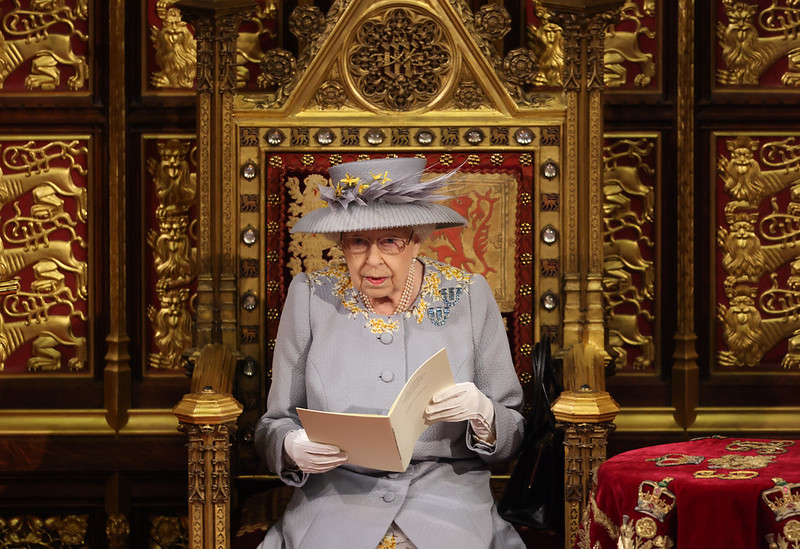
Her Majesty The Queen reads the Queen's Speech from the Throne.
Photo: Chris Jackson / WPA / Getty
See more photos on Flickr
Lord McFall took office as Lord Speaker on 1 May 2021, and the official parliamentary year began with the ceremony of State Opening and the Queen’s Speech on Tuesday 11 May. See more photos from State Opening on Flickr.
Immediately after State Opening, members debated the contents of the Queen's Speech over five days. New Lords committees were announced to investigate broad and long-term issues on the built environment, environment and climate change, industry and regulators and justice and home affairs.
Following on from the Queen’s Speech, the Lords began scrutiny of new bills. Members expressed concern regarding ground rents and unreasonable service charges for existing leaseholders in the main debate for the Leasehold Reform (Ground Rent) Bill. The debate on the key principles of the Dormant Assets Bill also took place in May.
The House responded rapidly to the pandemic and changed the way it works. Members continued to shape future working practices and how the House should work post-COVID-19 in a debate on remote participation and the hybrid proceeding.
Lords questions to the government in May saw members raise concerns on issues such as government handling of the COVID-19 pandemic, anti-Semitic attacks across the UK and the arrest of Roman Protasevich in Belarus.
June
The key debates of three new bills dominated in June. Members discussed the urgent challenge of climate change for the Environment Bill, the creation of the Animal Sentience Committee for the Animal Welfare (Sentience) Bill and Local Skills Improvement Plans for the Skills and Post-16 Education Bill. The Leasehold Reform (Ground Rent) Bill and the Dormant Assets Bill returned to the Lords for detailed examination.
Members challenged government action with debates on the child maintenance service, the impact of COVID-19 on children and trade agreements with Cameroon and Ghana.
In daily questions, the Lords raised issues on topics such as homeowner cladding-related costs, access to employment skills training for young people, and the transparency of the BBC.
July
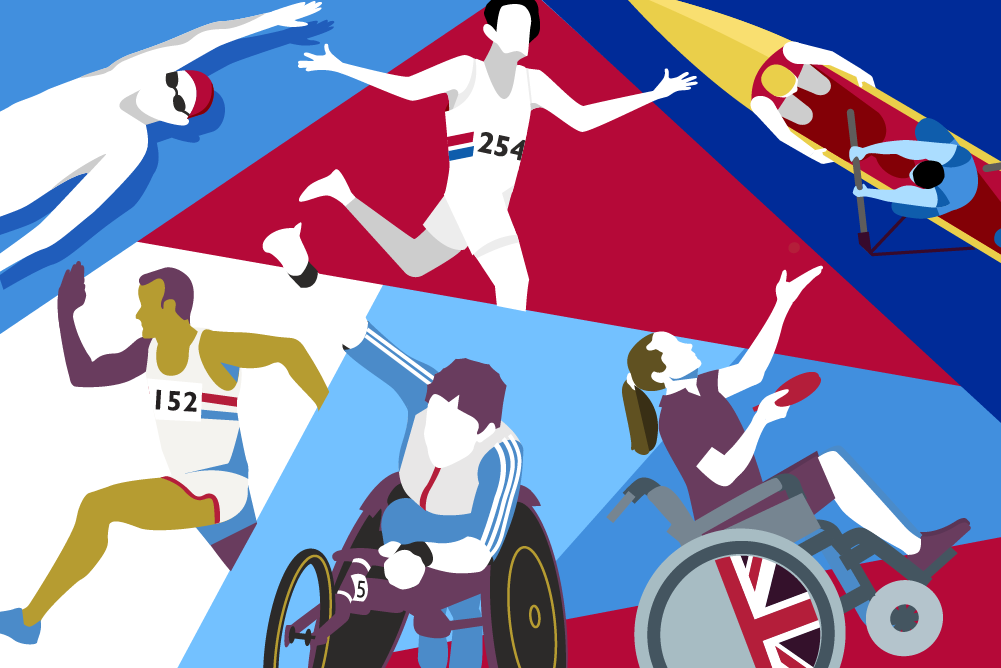
July saw members continue detailed examination of the Environment Bill, discussing issues including reducing water demand, boosting biodiversity and improving wastewater treatment. They also started line by line checks of the Animal Welfare (Sentience) Bill, Leasehold Reform (Ground Rent) Bill and Skills and Post 16 Education Bill.
Members highlighted issues with new regulations, raising concerns on calorie labelling, COVID-19 testing and mandatory vaccinations in care homes.
Members pressed government on police body-worn video, shortage of lorry drivers, international travel rules, illegal riding of e-scooters and support for older victims of domestic abuse.
The success of House of Lords Olympians and Paralympians was celebrated as the Tokyo 2020 Olympics got underway.
August
In August, the House was recalled during recess to press the government on the situation in Afghanistan. During the debate, members raised issues including support being provided to interpreters, and other locally employed staff who have assisted the UK in Afghanistan, and how humanitarian aid will be provided.
As the Olympics drew to a close, the role and work of the National Plan for Sport and Recreation Committee was highlighted as they continued their inquiry into the effectiveness of sport and recreation policies and initiatives.
September
The House of Lords returns to business in September 2021.
Photo: House of Lords / Roger Harris
See more photos on Flickr
As the Tokyo 2022 Paralympic Games came to an end in September, the achievements of Lords Paralympians was celebrated. They shared their experiences and talked about how the Paralympics has changed attitudes to accessibility.
Members returned after recess and were back to work questioning government, examining bills and investigating public policy.
In questions, members pressed the government on Afghanistan, the demolition of Grenfell Tower, EU imports checks and controls, leaseholder fire safety costs, retaining nurses in the NHS and safe standing at football matches.
Further checks and changes to the Environment Bill were made and the key areas of the Police, Crime, Sentencing and Courts Bill were debated.
Debates were held on behaviour change to meet net zero targets, the shortage of COVID-19 vaccines in the global south, standards in public life, and Universal Credit for people with mental health problems. The government committed to the fortification of UK flour with folic acid this month, a topic which members had campaigned on since 2013.
October
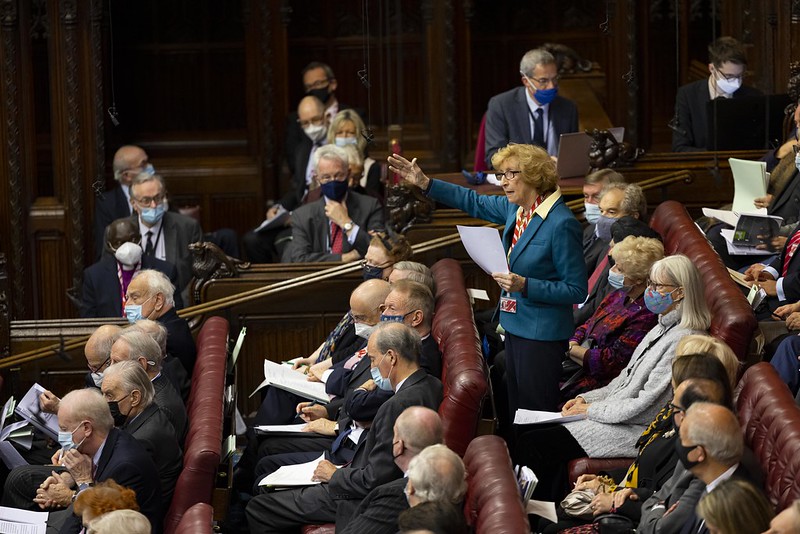
The House of Lords debates the Assisted Dying Bill
Photo: House of Lords / Roger Harris
See more photos on Flickr
October began with the House of Lords returning the Environment Bill to the House of Commons, asking them to think again on issues including reducing the impact of raw sewage discharges into rivers. Further legislation included changes to the Skills and Post-16 Education Bill where members agreed changes to improve SEN teacher training and support for students on Universal Credit. Line by line examination of the Police, Crime, Sentencing and Courts Bill started with suggested improvements on tackling child exploitation, mental health of the police force and raising police driving standards.
More than 130 members debated the Assisted Dying Bill, covering the ethical issues involved and utilising their experiences and expertise. Members pressed the government in questions including COVID-19 plan B, HGV driver shortages and removal of dangerous cladding from high-risk buildings.
October 2021 was Black History Month and the House of Lords debated ethnic pay gap reporting. Information was shared throughout the month about Black members past and present and Lords work on issues affecting Black communities.
The House also paid tribute to the late Sir David Amess MP on 18 October.
November
November saw members raise environmental issues during COP 26. The Environment Bill was agreed by the House of Lords, with a Lords change on reducing single use items and further changes that members had pressed made by the government, including reducing the impact of raw sewage discharges into rivers and coastal waters. Members debated tackling climate change and the importance of Chalk Streams. Plus, questions to the government on Net Zero, fossil fuel extraction projects and access at COP 26.
November was Disability History Month. Members raised concerns on issues facing disabled people and urged the government to make improvements during a debate on art and music-based intervention in dementia care.
Members also quizzed the government in questions on food shortages in Afghanistan, securing the release and return of Nazanin Zaghari Ratcliffe and COVID-19 vaccine donations to other countries.
Following over 60 hours across 11 days of debate and more than 450 amendments, the House of Lords completed line by line examination of the Police, Crime, Sentencing and Courts Bill, debating changes on domestic and sexual violence, maternity services in prison, penalties for death by dangerous driving and police powers relating to protests. November came to a close with the main debate on the Dissolution and Calling of Parliament Bill, seeking to repeal the Fixed-Term Parliament Act.
December
December opened with urgent questions on tackling HIV/AIDS in the UK and globally, power outages in the north of the England following Storm Arwen and a debate on the value of the BBC in the UK and abroad. The start of the month also saw Purple Light Up, with Clerk of the Parliaments Simon Burton talking about the importance of inclusion with ParliAble member Aaron Speer. Later in the month, members debated challenges to freedom of speech in a debate put forward by the Archbishop of Canterbury, and Scotland’s contribution to economic recovery.
In legislation, detailed scrutiny of the Police, Crime, Sentencing and Courts Bill has continued and is expected to run until January. Members have been proposing and debating changes including life sentences for manslaughter of an emergency worker. The Health and Care Bill also began its progress through the Lords with a debate on its main principles at second reading, where members raised concerns on topics including a cap on care costs and re-organising the NHS while it is still dealing with the impact of the COVID-19 pandemic.
The House also concluded examination of the Animal Welfare Bill, with the draft law passing to the Commons for its consideration. The draft includes new provisions to give protection to include certain cephalopods and decapods, such as octopus, crab and squid, following members convincing the government to include them.
The House also asked the government to think again on the Advanced Research and Invention Agency Bill. Members agreed to a change to prevent businesses supported under the draft law from being sold to overseas businesses and for the government to retain equity in businesses it supports.
Members continue to scrutinise secondary legislation, with new COVID-19 regulations under the spotlight in December. Members raised concerns on several regulations, including access to Universal Credit for disabled students, shortages of HGV drivers and a lack of impact assessment on requirements for COVID-19 vaccinations in health and social care settings.
The House of Lords rose for recess on Thursday 16 December and is expected to return to business on Wednesday 5 January 2022. See what is on the agenda.
Committees
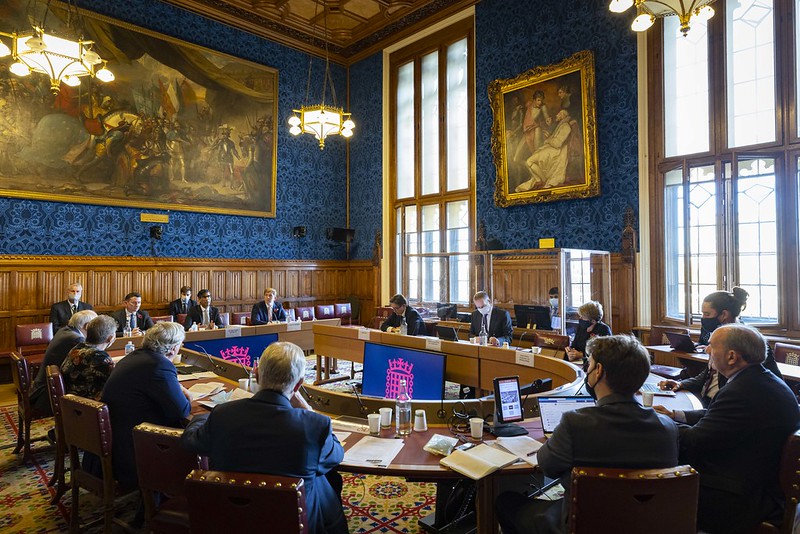
The House of Lords Economic Affairs Committee speaks to Chancellor Rishi Sunak MP
Photo: House of Lords / Roger Harris
See more photos on Flickr
House of Lords committees continued their important work throughout the year, publishing reports on topics including:
- new trade agreements
- healthy ageing
- trade in goods with the EU
- building a cooperative Union
- freedom of expression online
- the Bank of England’s use of Quantitative Easing
- the use and scrutiny of powers during the COVID-19 pandemic
- the UK-China relationship
- the future of Channel 4
- the role of public services in overcoming child vulnerability
- the UK’s vulnerability to future risks
- a national plan for sport, health and wellbeing
- tackling youth unemployment.
New committees were also formed this year on topics including the built environment, environment and climate change, industry and regulators and justice and home affairs.
Podcast
This year, Matt and Amy have covered a wide range of topics in the House of Lords Podcast. In February they spoke to Lord Cashman about campaigning for LGBTQ+ rights, fighting for change was the focus in March with Lord Alton of Liverpool and Baroness Newlove, campaigning for subpostmasters and the risks the UK faces in the future was the topic in June. Later in the year, we heard from Chloe Mawson about being the first female Clerk Assistant, plus Parliament's two Speakers, what comes after COP, the balance of power between the government and Parliament on secondary legislation and the need for a national plan for sport, health and wellbeing.
- See a full list of episodes, plus links to listen and subscribe
Get involved
Watch
Questions, debates and scrutiny of legislation is streamed live online for free. Watch chamber and Lords committee meetings on Parliament TV.
Read
All business in the House of Lords chamber and in Grand Committee is transcribed and available to read from around three hours after it happens. Read it free online in Lords Hansard.
Follow on Twitter
Visit @UKHouseofLords on Twitter for highlights of each day’s work in the House.
Follow the hashtag #HouseofLords for what’s happening, or #LordsQs for details of questions put to the government at the start of business Monday to Thursday.
Other social media
Follow the House of Lords on Facebook, Flickr, Instagram, LinkedIn and YouTube for highlights, photos and videos from the UK Parliament’s second chamber.
Subscribe to the House of Lords newsletter
Sign up and receive weekly updates on the latest news stories, draft law scrutiny, committee work and discussions happening in the Lords.

